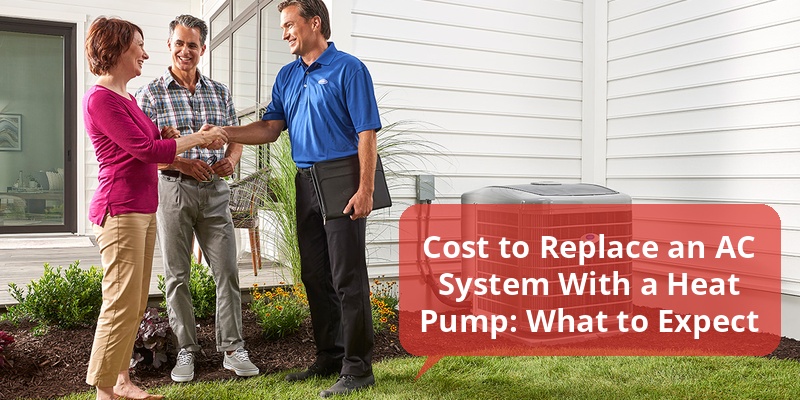Replacing an air conditioning (AC) system with a heat pump is a popular choice for homeowners seeking both cooling and heating solutions in a single, efficient unit. The cost to replace an AC with a heat pump varies significantly based on several factors, including equipment type, installation complexity, and geographic location. This article provides a detailed breakdown of expenses and essential considerations for American homeowners planning this upgrade.
| Cost Component | Typical Price Range | Notes |
|---|---|---|
| Heat Pump Unit | $3,500 – $7,500 | Varies by size and brand |
| Installation Labor | $1,200 – $3,500 | Depends on system complexity |
| Removal of Old AC | $300 – $800 | May include disposal fees |
| Additional Parts & Upgrades | $500 – $1,500 | Includes ductwork, thermostats |
| Total Estimated Cost | $5,500 – $13,300 | Typical full replacement range |
Understanding Heat Pumps and Their Benefits
A heat pump is an advanced HVAC system that provides both cooling and heating by transferring heat rather than generating it through combustion or electric resistance. This dual functionality makes heat pumps an energy-efficient alternative to traditional AC units and furnaces, especially in moderate climates.
Heat pumps reduce utility costs by providing efficient temperature control year-round. Additionally, modern heat pumps often have variable speeds and inverter technology, improving comfort and reducing wear on equipment.
Factors Influencing the Cost of Replacing AC With a Heat Pump
The total cost to replace an AC with a heat pump depends on several key variables:
- System Size: Larger homes require higher capacity heat pumps, which cost more.
- Type of Heat Pump: Air-source heat pumps are common and less costly while ground-source (geothermal) heat pumps offer greater efficiency but with much higher upfront expenses.
- Installation Complexity: Homes with outdated ductwork or non-compatible systems may require extensive modifications.
- Brand and SEER Rating: High-efficiency models tend to be pricier but generate long-term savings.
- Geographical Location: Labor costs and regional demand can impact prices across the U.S.
Cost Breakdown: Equipment and Installation
Heat Pump Equipment Cost
The price of the heat pump unit itself usually falls between $3,500 and $7,500. Air-source units are most common and affordable. High-efficiency models can demand more but offer greater energy savings.
Installation Labor Costs
Installation labor for replacing an AC with a heat pump typically ranges from $1,200 to $3,500. Labor costs include mounting the unit, electrical connections, and system testing. More complex installations involving ductwork or electrical panel upgrades will push costs higher.
Removing the Old AC Unit
Removing the existing AC system usually costs between $300 and $800. This includes disconnecting, detaching, and disposal of the old equipment, which can vary depending on local regulations.
Additional Parts and Upgrades
Additional expenses may include new thermostats, duct sealing or replacement, refrigerant line installation, or upgrading electrical components. These can add $500 to $1,500 to the project cost.
Comparing Heat Pump Replacement Costs With Traditional AC Replacement
| Component | Heat Pump Replacement | Traditional AC Replacement |
|---|---|---|
| Equipment | $3,500 – $7,500 | $2,500 – $5,000 |
| Installation Labor | $1,200 – $3,500 | $1,000 – $2,500 |
| Total Estimated Cost | $5,500 – $13,300 | $3,500 – $7,500 |
Although heat pump replacement costs are typically higher upfront, the combined cooling and heating capability can replace multiple systems, potentially lowering overall household HVAC expenses over time.
Energy Savings and Rebates to Offset Replacement Costs
Homeowners can benefit from significant energy savings by switching from a traditional AC to a heat pump, with some models reducing heating and cooling costs by up to 40%. Many states and utility companies offer rebates, tax credits, or incentives to encourage the adoption of energy-efficient heat pumps.
- Federal Tax Credits: The Inflation Reduction Act provides federal tax credits for qualifying heat pump installations.
- State Incentives: Many states offer rebates and programs that reduce installation costs.
- Utility Company Discounts: Some utilities provide rebates or financing options for heat pump upgrades.
These incentives can significantly lower the effective cost of replacing an AC with a heat pump, making the investment more attractive.
Choosing the Right Heat Pump for Your Home
Selecting the appropriate heat pump involves assessing your home’s size, insulation, climate, and existing infrastructure. Popular types include:
- Air-Source Heat Pumps: Best suited for moderate climates, these are widely available and cost-effective.
- Ductless Mini-Split Heat Pumps: Ideal for homes lacking duct systems, providing zone-specific heating and cooling.
- Geothermal Heat Pumps: More expensive upfront but highly efficient by utilizing the earth’s stable temperatures.
Consultation with a licensed HVAC professional is critical for evaluating options and ensuring the system matches your home’s needs.
Installation Process and Timeline
Replacing an AC unit with a heat pump usually takes two to three days. The process includes:
- Inspecting existing ductwork and electrical setup
- Removing the old AC system
- Installing the heat pump outdoor and indoor units
- Connecting refrigerant lines and electrical systems
- System testing and homeowner orientation
Preparing ahead by choosing the right contractor and scheduling accordingly can help ensure a smooth replacement with minimal disruption.
Maintaining Your New Heat Pump for Longevity
To maximize the lifespan and efficiency of a heat pump, regular maintenance is essential. This includes:
- Annual professional inspections and tune-ups
- Cleaning or replacing filters every one to three months
- Ensuring outdoor units are clear of debris and vegetation
- Promptly addressing any performance issues or noises
A well-maintained heat pump can last 15 years or longer, offering reliable comfort and energy savings to homeowners.
